Problem Statement
Esports is a novel type of sport that is rapidly developing along with the technology, captivating the attention of millions of users. Egames, as a competitive online sport, has gained a large player base over the course of several years, designing multi-million winning funds at the matches. The primary purpose of creating this partnership is to make sure that all mature adults could easily manage their leisure time in the most entertaining way. To give a more vivid picture of a global cybersport, revenue has increased to $1.1 billion in 2020, displaying a 15.7% growth in a year (NewZoo, 2020). Despite such popularity and profitability of the gaming tournaments, it is most prevalent and accepted by the younger audience.
Throughout the video gaming industry’s existence, the prevalence of its fans varied between 17-24 years old, with individual cases of teams that are of more mature age. Thus, older people do not seem to express any noticeable interest in the cybersports industry, which is becoming the principal opportunity for Esport to increase its profitability. The reason for the low involvement of adults is explained by the majority of their common points of view for video games not being a serious activity or one that may offer an income (Parker, 2019). Recently, more people have started to try Egames and take part in the tournament, gradually expanding the audience reach; nevertheless, the problem remains up to date and provides an extensive opportunity for corporations to attract a large portion of a mature audience and expand their reach.
Multiple types of investigations prove the low engagement of older people in the Esports industry. Pew Research Center confirmed their findings, stating that 28% of middle-aged Americans play video games, compared to 55% of the youth (Parker, 2019). Such information provides vital data, stating that the cybersport industry engagement across the world is built on a specific age segment and requires the reach widening; otherwise, the growth will laniary start to fall. The common assumption among adults includes that Esports is not an earnest hobby, only retaining modern youth by computers is the primary prejudice affecting the formation of older leagues.
A visual communication campaign designed and aimed specifically at the more mature audience has a high chance of becoming a valuable asset for expanding the age outreach of Egames. Concise, simple, yet informative advertisement will ensure the industry’s interest, which they can further explore and experience. The main goal of the campaign is to deliver the idea of cybersport as an industry with high potential, where each person with any set of physical abilities or computer skills can develop and even profit.
Sponsor
The sponsor chosen for the visual campaign is one of the most influential game developers and tournament organizers in the industry – Riot Games. Established in 2006 in the University of Southern California roommates, the corporation has significantly grown, becoming one of the most influential in the cybersports community (Riot Games, n.d.). The company’s ability to withstand the rapid expansion along with the Egames provided for the current success, which now shifted the focus to the three main development directions – the production of videogames, publishing, and online-tournament organization.
Riot Games has a clear vision of the current industry’s state and will be highly interested in attracting more players to their outreach. Riot Games’ current mission statement is: “We aspire to be the most player-focused game company in the world,” which perfectly adheres to the campaign’s principal message (Riot Games, n.d.). The corporation’s main success has come after the first developed video game League of Legends, became the most-played PC sport in the world, which gave Riot Games a considerable push for development and expansion.
The company is accountable for organizing large tournaments based on their most prosperous game League of Legends, inviting millions of participants and spectators. Operating in the tournament organization since 2011, Riot Games is responsible for the League of Legends World Championship, the Championship Series, the European Championship, and the Mid-Season Invitational (Riot Games, n.d.).Therefore, Riot Games, as a digital content creator and tournament developer, should be interested in increasing its income through the engagement of the new gaming culture. Adding new competitions or widening the categorizing of existing ones to include a more mature audience than average will show the company’s desire to globally popularize Esports and willingness to equalize the industry.
Riot Games’ general goal is mainly centered on the idea of establishing a partnership that will continue improving already existent games instead of conventionally programming new ones. Such direction of development allows our visual campaign to approach Riot Games and offer collaboration, which can provide an opportunity to expand their player base, adhering to the primary goal. By already acquiring the favorability and company awareness of young gamers, the next logical step for Riot games would be widening its demographics to older customers.
Target Audience
The target audience for the campaign is the 30-50 age group community, who are not familiar with the Esports industry. Older adults are a more intricate audience to influence, though, in terms of success are expected to bring significant revenues to the project. The relevance of the 30-50 age group lies within the lines of its low engagement. This age segment does not usually show a desire to play cybersports mostly due to the negative attitude.
It is common knowledge that, in the majority of cases, the older the audience, the less familiar with the technology they have. Pew Research confirms that 77% of older adults would need assistance with setting up a new device (Wakefield, 2015). Even though studies found a lack of confidence in the digital world, they also show that the adoption of new devices increases the desire to know more in relevance to a passion, which Esports can easily become (Ben & Peddel, 2017). Thus, the target audience has the potential to bring significant revenue for cybersports and to develop a new generation of gamers.
The selected age range can define a new era for Egames, providing opportunities for expansion, new products, and services creation, subsequently increasing the revenue of the billion-dollar industry. In addition, the goal-oriented approach to hobbies pushes more mature people after their 30s to pursue leisure that is related to a younger audience, but with more extensive financial capabilities, proven by multiple research (Drolet & Yoon, 2020). Attracting the middle-age group to Egames has a high potential of creating a new revenue channel that is much more prospective than the current average aged players. Therefore, investing in a visual campaign aimed to attract an older audience to cybersports is expected to bring major profits and create new opportunities for developers and advertisers.
Besides, the research conducted to seek similar campaigns has shown that there are few cybersports initiatives that support the 30-50 age group audience. The prevalent majority of found tournaments or teams are of 60+ age, as the gaming center opened in Japan only for the previously mentioned age group (Gaming instead of retiring, 2020). Additionally, a few communities were found around the world that encourage middle-aged people to join cybersport; however, no professional gamers association or tournaments were found. Therefore, popularized Esports to either the youngest or the oldest audience. It is clear that there is a vital need for audience expansion to the most financially assured and independent age group, which clearly lacks among the current Egames player base.
Behavior
The visual campaign’s ultimate goal is to change the older audience’s attitude toward the Esports industry and, most importantly, convince them to become a regular competitor and client. The expansion of the industry with the 30-50 age group will significantly alter the competition in cybersports, introducing these participants as equal rivals for younger experienced players. Presenting older participants not only as amateurs but also as competent players will significantly increase the competitiveness of Egames, subsequently creating new products, events, and games.
Riot Games, as a world leader in the gaming industry, continually seeks improvement opportunities, as global companies in a rapidly developing industry like Esport cannot remain static. There are many evolving businesses that thrive on outrunning Riot Games, and for that reason, they must either adapt to new trends in the market or create them. Moreover, the financial stability of the targeted audience is a prominent constituent in the reasoning for supporting this age group and developing new opportunities designed according to their preferences and abilities. Creating a specific cybersport culture of people 30-50 age-old is a perspective opportunity for the further advancement of Riot Games, and subsequently, the Esports industry.
Gaming companies, like Riot Games, are constantly interested in the expansion of their customer base. Acquirement of a new age segment gives a chance for the development of new games, campaigns, and tournaments targeting this population segment. With the financial soundness of this age group, it can potentially significantly increase the net profit for Riot games, where the new products may include coaching, video guides, and new equipment. Such a new channel of income is a perspective way to additionally profit from those just entering the Egames, especially when their financial status highly exceeds those of average aged players.
Channels
Connecting with an older audience on social media is more challenging than with teenagers or young adults, as the selection of communication channels is less diversified. Based on the results of the studies, 30+ people are proven to predominantly use Facebook as their primary or only social media. According to the pew research center, 87% and 79% of adults aged 30 to 49 use YouTube and Facebook, respectively, therefore becoming the most prevalent and effective communication channels (Perrin & Anderson, 2019). Consequently, Facebook and YouTube are to become the primary platforms for advertisement distribution.
YouTube has become a marketplace and an effective tool for promoting one’s products or services, uniting all age groups. Considering the number of gaming channels and their high popularity, the Egames campaign would become outstandingly productive. Lenovo has achieved successful results from their YouTube campaign, targeting particularly older players, which turned out to be beneficial (Cooke, 2019). Influencer marketing and direct or native advertisement involving top gamers, as well as ads between the videos correctly targeted at the audience, are to show good results in terms of conversion. Consequently, the promotion of the Egames industry on such a comprehensive audience platform as YouTube is most likely to have high conversion due to the prevalence of the 30-50 age group daily watching it.
Facebook is one of the best platforms for social media advertisement. The website has created an extensive amount of tools for setting up a detailed campaign, ensuring to cover specific audiences. It allows the advertiser to set various goals and update the campaign according to the preferences of the companies without the need to put in a large number of investments. Generating creative content and engaging teasers will ensure a quick conversion attracting the desired segment, which in this case, people 30-50 years old with no particular interest in Esports. The results of the research that state a wide use of Facebook by this audience creates many possibilities for testing and setting up ads to reach the goal.
Message Concept
As previously mentioned, older adults often seek to be relevant to modern technology; therefore, Esports is one of the best hobbies that a representative of our target audience may acquire. A lifespan theory states that adults tend to desire to mesh with the environment or change it to be in control of it (Drolet & Yoon, 2020). Therefore, an interest in the latest technology is people’s model of adapting to the current environment in order to comfortably function and continue to pursue their goals. Adaptation to a high-tech environment will assure the feeling of confidence in the adults and may potentially bring them closer to their children.
The “midlife crisis” is a common experience for adults occurring after their 30’s. Fear of stagnation is what may trigger the crisis, where the realization of mortality and reminiscence of the past causes a person to develop such a condition (Therapy for Midlife Crisis, Therapist for Midlife Crisis, 2015). Such a period in a person’s life creates many mental issues and overall changes somebody’s perception of life. Acquiring a new hobby such as cybersport may become a trigger to end a “midlife crisis” in various ways.
Egames are the best way to escape reality and forget about the daily hardships as it distracts a person from whichever situation is going on. Moreover, a high interest in this industry may become a new income channel for a person struggling with their identity. Esports is a highly profitable industry, that is opening its doors to a new generation of gamers with the new visual campaign, which has the potential to convert pessimistic middle-aged people into cybersport active participators.
The ultimate benefit of Esports for the targeted audience lies within career opportunities. Many people feel dissatisfaction with their workplace, afraid to start something new. By convincing the audience to start getting involved in Esports as a hobby in the first place, these newcomers may become successful in this industry and start a new path of pursuing a career in cybersport. As a consequence, the mental state and a person’s overall satisfaction with life may significantly increase as a result of trying new leisure. Moreover, various coaching programs are available in electronic sports, with Riot Games being one of the most successful deliverers of such interactive learning. Enhancing the coaching programs is a great way to attract people unsure of their ability to become a top players in Egames.
Images Section
The first image is directly related to the target audience, showing its representative, who is engaged in video games. The image can be used as a part of the visual campaign to attract the desired segment of people’s attention.
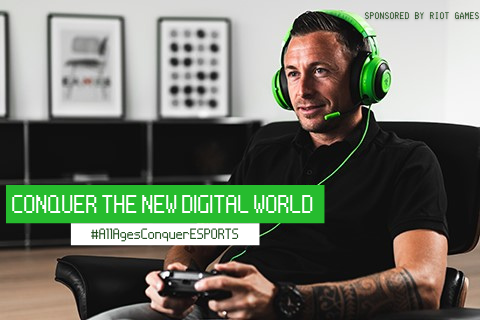
The image as a part of the Esports visual campaign represents behavior and shows how coaching is conducted in the world of Esports. The photo’s message includes coaches’ primary responsibilities, such as identifying the main strengths and weaknesses and building strategies to win as many tournaments (Paul, 2019).
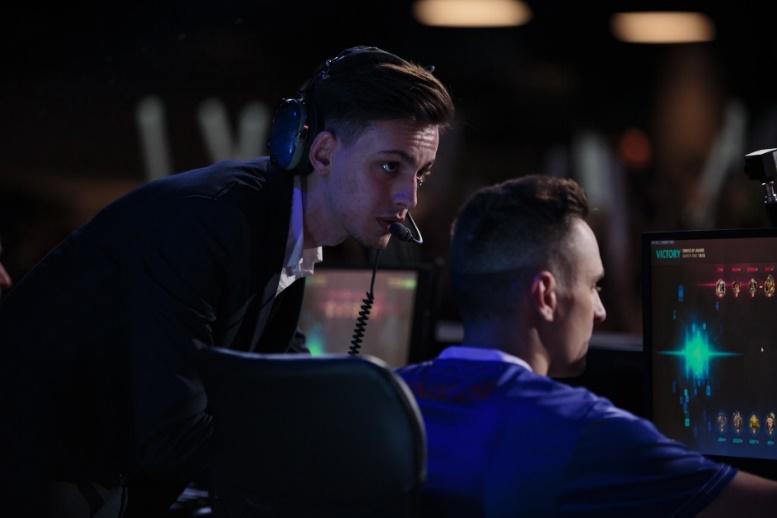
This image is a great attention grabber and may be used as a part of a visual campaign representing the message concept frequently used in the chosen communication channels. Similar to the second image, it refers to the coaching part of Egames; however, it does not state it directly. (“How to organize an esports tournament,” 2019)
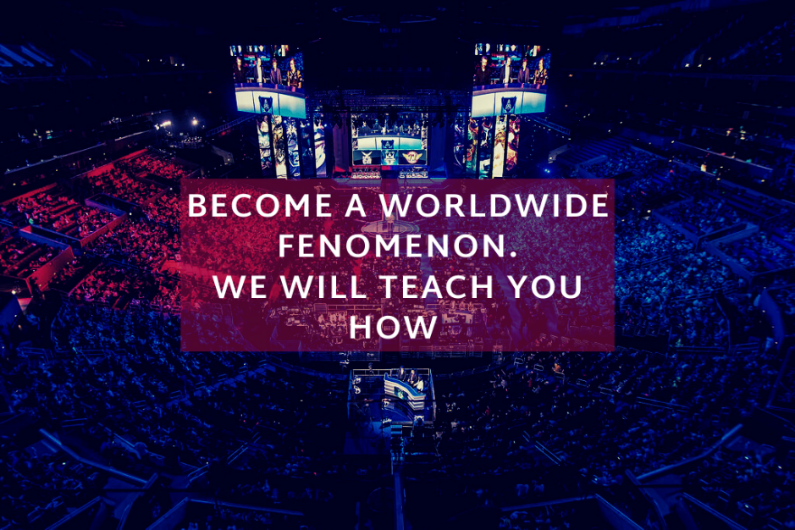
This image is expected to have a good conversion, particularly from the targeted audience, and give them hope to quickly resolve the existential problem, subsequently pushing a person to click o the advertisement (Photographee.eu, n.d.).
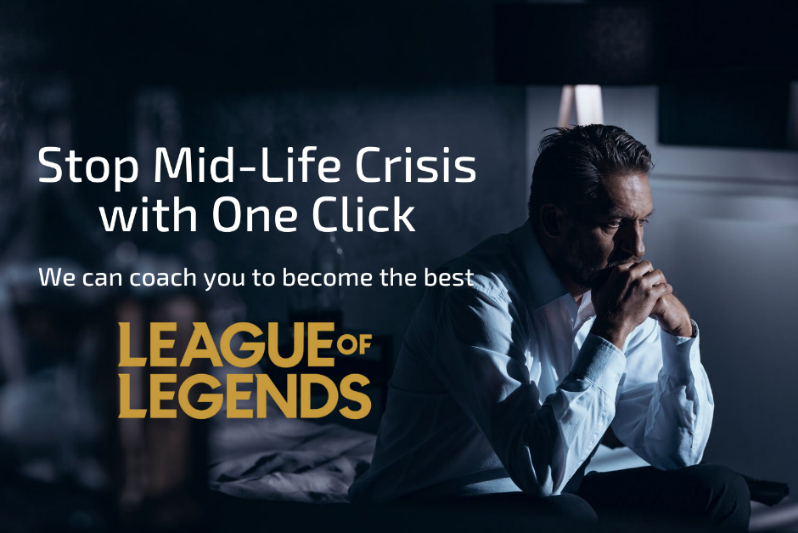
Including an image with the sponsor’s main game is essential for the campaign. The company must be recognized and acknowledged since Riot Games are the project’s primary investor (Riot Games, n.d.).
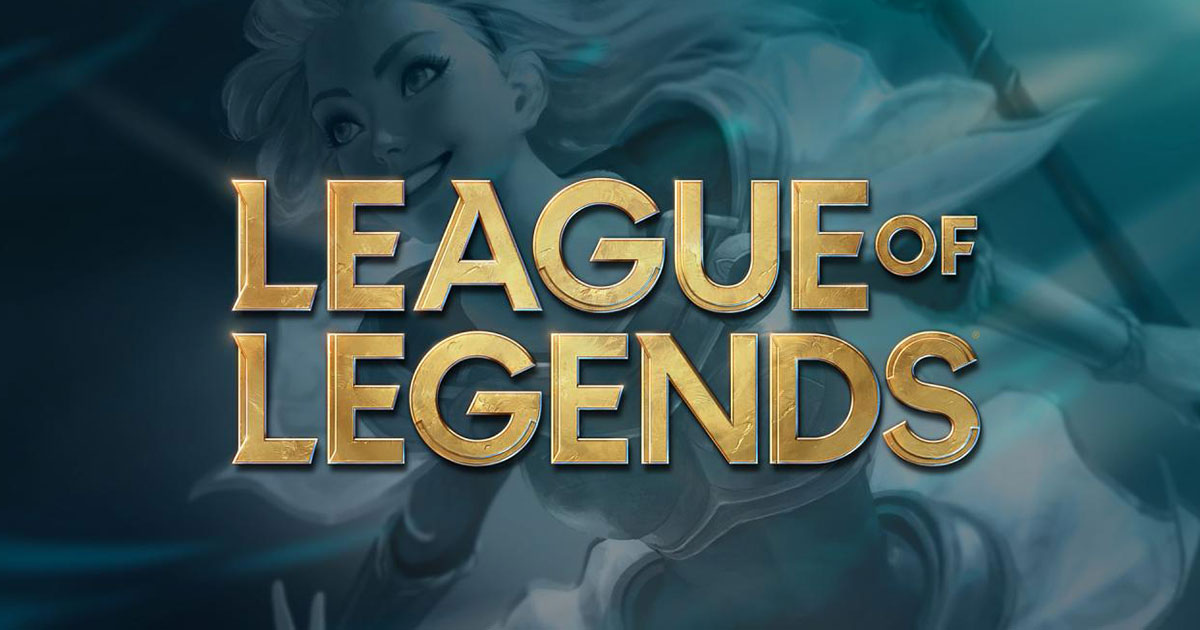
This image presents a dare to the viewer, which is a great asset to use in advertising. Moreover, the man in the photo refers to the targeted audience, increasing the chance of the correct conversion (“Virtus. pro’s Deal with the Devil,” 2020).
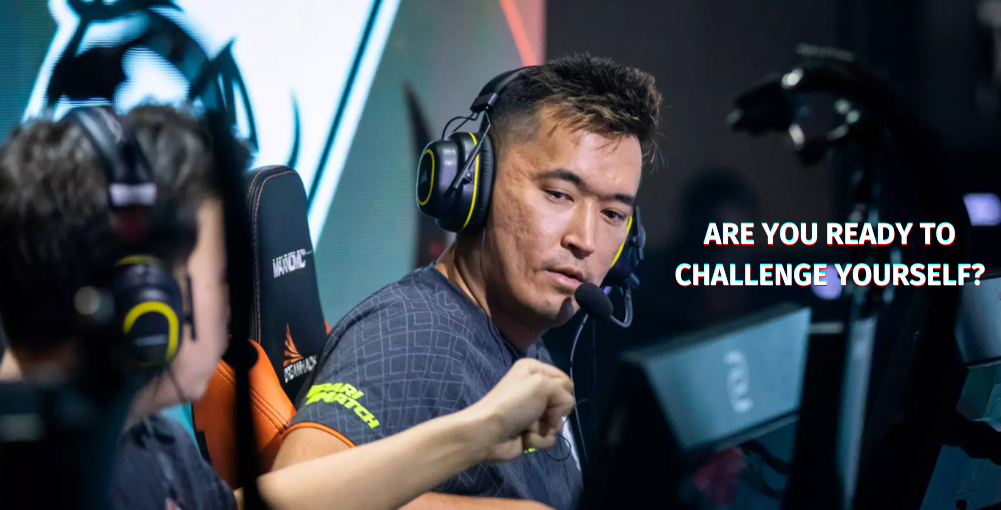
The infographic contains an overview of the chosen communication channels, including their prevalence among the targeted audience. Additionally, it has arguments in favor of YouTube and Facebook, proving why these platforms are the best for the campaign.
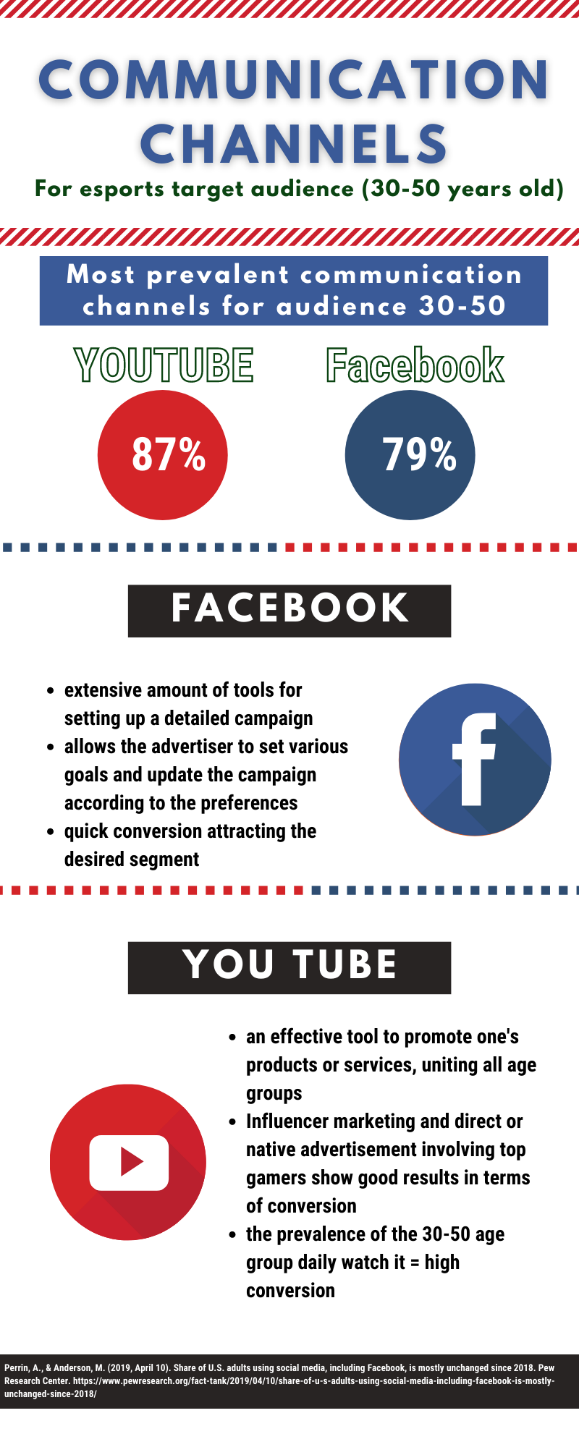
The second infographic is an overview of the Esports industry in relevance to the 30-50 audience targeted by this visual campaign. Problems and benefits for the mentioned age group are mentioned to show the significance of the cybersport expansion.
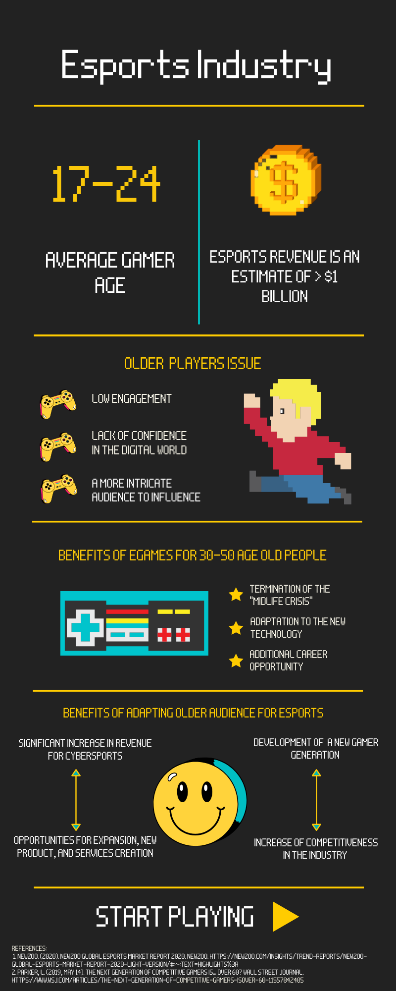
The final infographic is a call to action that primarily emphasizes the need for adults to engage in Esports. Moreover, it mentions the sponsor – Riot Games, to provide a brief overview of the company and gain more familiarity. Lastly, cyber sport’s goal is mentioned as representing its desire to expand its reach to all age groups.
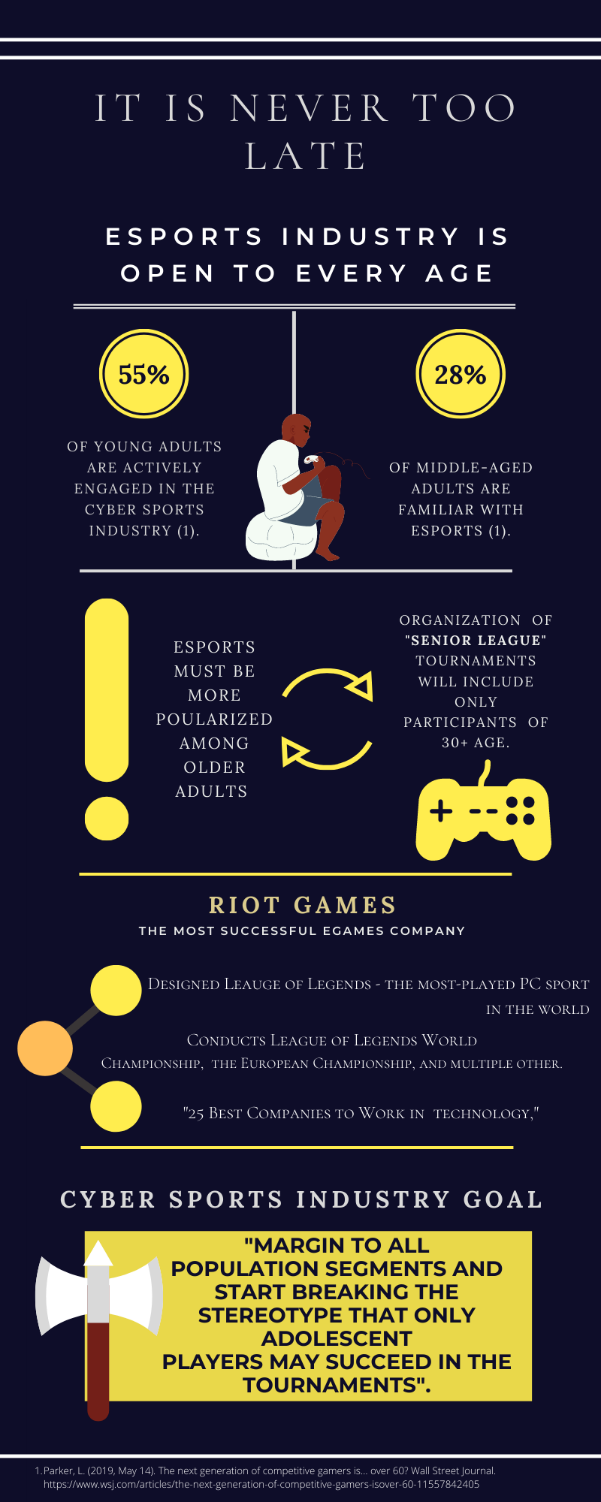
References
Ben, J., & Peddel, S. (2017). When interest pays off: The relationship between motivation, wellbeing and learning of technologies by older adults. Proceedings of the Design4Health Melbourn.
Drolet, A. L., & Yoon, C. (2020). The aging consumer : perspectives from psychology and marketing. Routledge.
How to organise an esports tournament. (2019). In Weezevent.
NewZoo. (2020). Newzoo Global Esports Market Report 2020. Newzoo.
Parker, L. (2019). The next generation of competitive gamers is… over 60?Wall Street Journal.
Paul, R. (2019). Paris Eternal head coach daemoN steps down. In Blizzard Entertainment.
Perrin, A., & Anderson, M. (2019). Share of U.S. adults using social media, including Facebook, is mostly unchanged since 2018. Pew Research Center.
Photographee.eu. (n.d.). Portrait of a lonely mature man with depression sitting on a bed in a gray room with bottles of alcohol standing around. In Shutterstock.
Riot Games. (n.d.). League of Legends.
Riot Games. (n.d.). Values.
Therapy for midlife crisis, therapist for midlife crisis. (2015). Goodtherapy. Web.
Virtus.pro’s Deal with the Devil. (2020). In Dreamhack | Flickr.
Wakefield, J. (2015). The generation that tech forgot. BBC News.